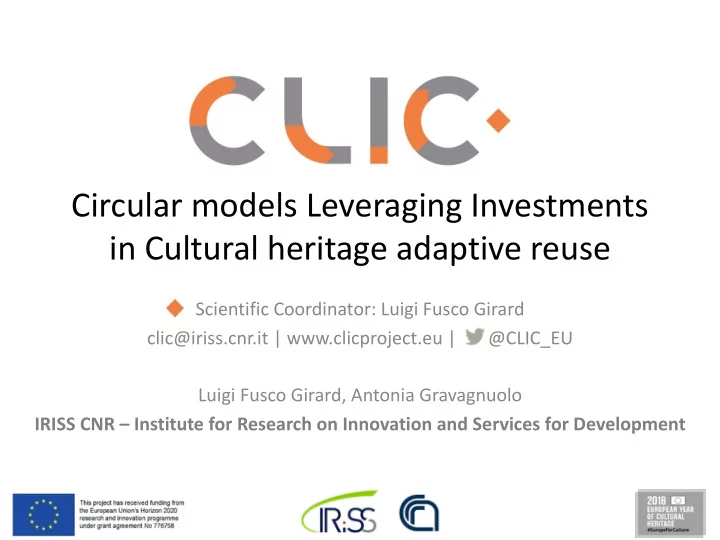

Circular models Leveraging Investments in Cultural heritage adaptive reuse Scientific Coordinator: Luigi Fusco Girard clic@iriss.cnr.it | www.clicproject.eu | @CLIC_EU Luigi Fusco Girard, Antonia Gravagnuolo IRISS CNR – Institute for Research on Innovation and Services for Development
Context and key concepts Key concepts of the CLIC project : cultural heritage adaptive reuse , circular economy , circular city/territory . But why these keywords are put together? Circular Economy and Cultural heritage (and landscapes) adaptive reuse have similar objectives: - to enlarge the time horizon of resources , ideally in an indefinite time ( enlarging the perspective of «here and now» and introducing a longer time horizon in choices ) - to enlarge the set of values / objectives including also ecological and social ones in choices However, cultural heritage and landscape are absent from the physical-spatial context of emerging circular city/city-region models. The Circular Economy aims to reduce the growing entropy generated by our current production- consumption economic models. The Circular Economy promotes – and it is founded on – a culture of cooperation , that reduces social entropy , improving resilience . In this perspective, the Circular Economy can help the effectiveness of economic processes , but also to stand against the growing forces of fragmentation and atomization of the European society , stimulating more social cohesion .
Focus on CULTURAL HERITAGE ADAPTIVE REUSE and CIRCULAR ECONOMY CLIC develops, tests and validates innovative “circular” business, financing and governance models to place cultural heritage adaptive reuse as at the forefront for the implementation of a European model of circular economy and circular city-region centered on the regeneration of cultural and natural capital
Description Methodology: from knowledge development to model testing, validation and transfer 3 Years: 2017- 2020 Trans-disciplinary approach CLIC Start-up competition in 2020 Horizon 2020 Framework Programme for Research and Innovation - Grant Agreement 776758 | 15 Research and Practice Partners from 9 EU Countries | Total funding 5 M€ Funded under the Call SC5-22-2017 Innovative financing, business and governance models for adaptive re-use of cultural heritage
Impacts/Expected results Validation of integrated approaches and strategies for cultural heritage adaptive reuse , comprising innovative finance with high leverage capacity , business models and institutional and governance arrangements that foster multi-stakeholder involvement, citizens and communities’ engagement and empowerment ; New investments and market opportunities in adaptive reuse of cultural heritage, also stimulating the creation of start-ups ; An enabling context for the development and wide deployment of new technologies, techniques and expertise enhancing industrial competitiveness and contributing to economic growth, new skills and jobs ; Innovative adaptive reuse models that are economically, culturally and socially inclusive ; Contribution to implementing the Sustainable Development Goals (SDGs) (Goals 1, 15, 11 particularly), the United Nations New Urban Agenda , and COP21 . Contribution to a new production-consumption culture in harmony with nature, learning (and not “taking”) from nature itself.
Partnership Institute for Research on Innovation and Services for Development (IT) (Coordinator) Uppsala University (SE) ICHEC Brussels Management School (BE) University College London (UK) Eindhoven University of Technology (NL) University of Portsmouth (UK) University of Nova Gorica (SL) Vienna University of Economics and Business (AT) University of Warsaw, Institute of Social Science (PL) ICLEI Europe (DE) FacilityLive (IT) Västra Götaland Region (SE) City of Rijeka (HR) City of Salerno (IT) Pakhuis de Zwijger Foundation (NL)
Recommend
More recommend